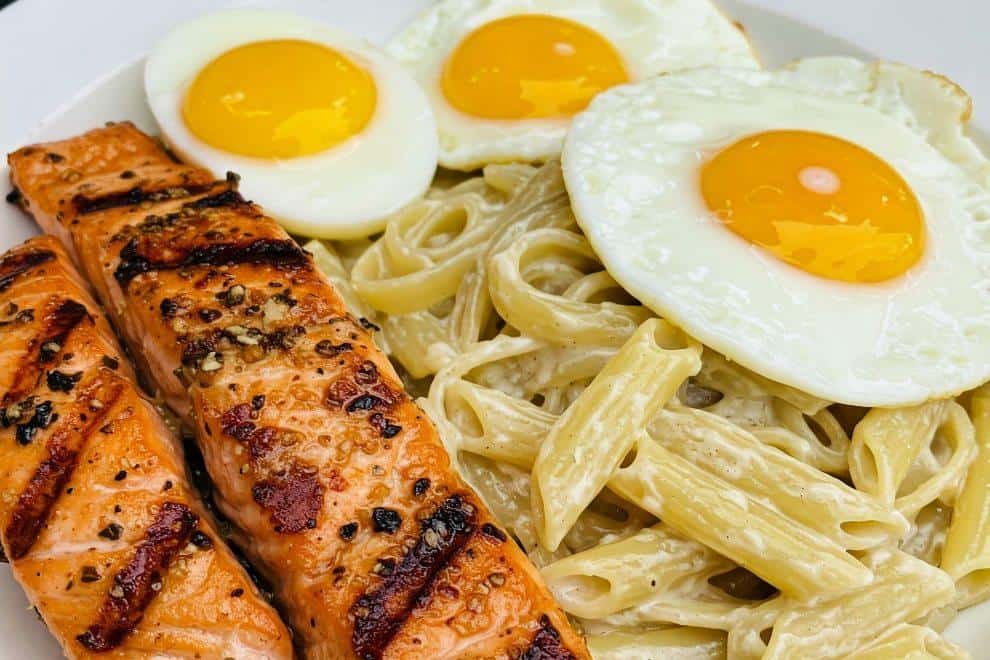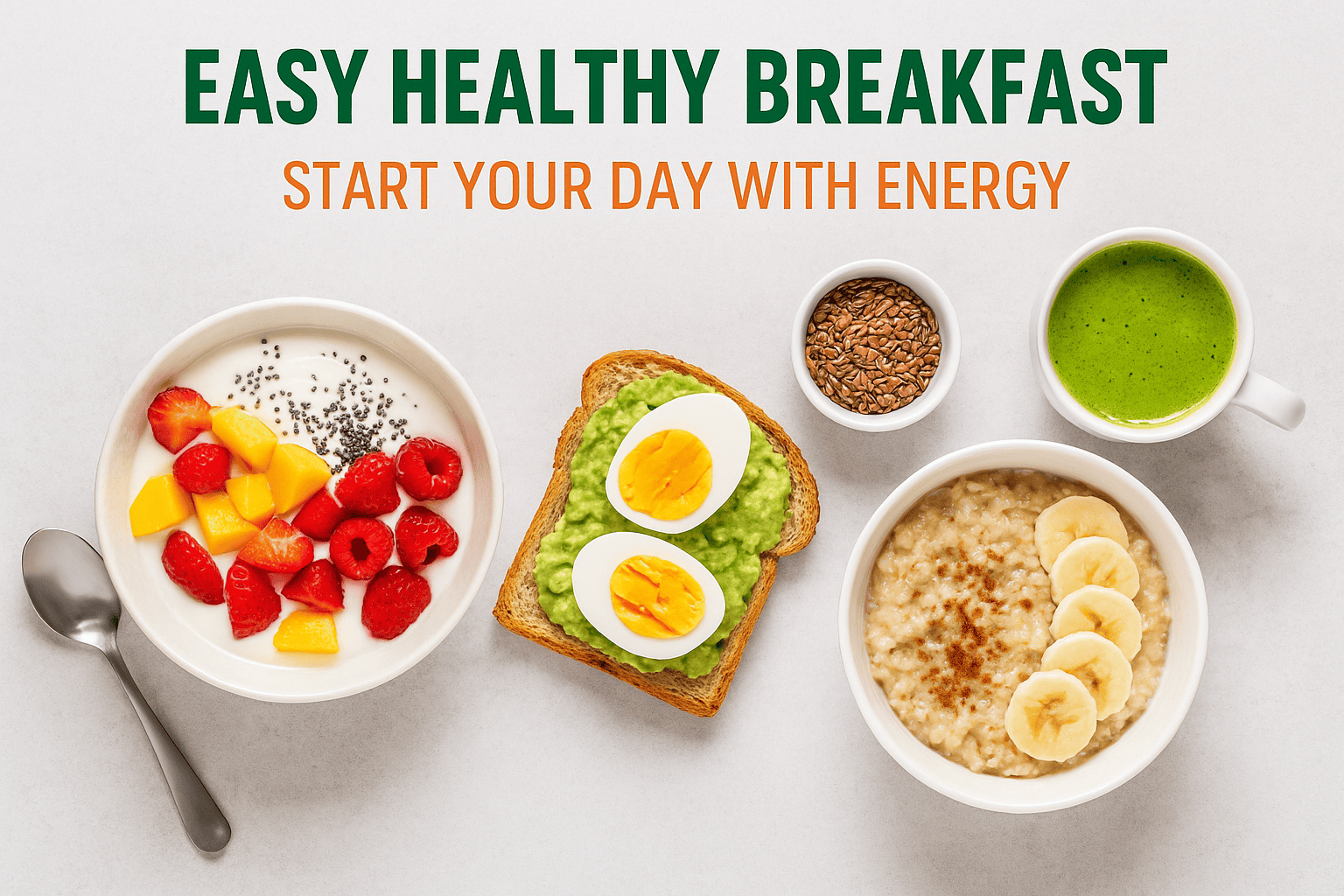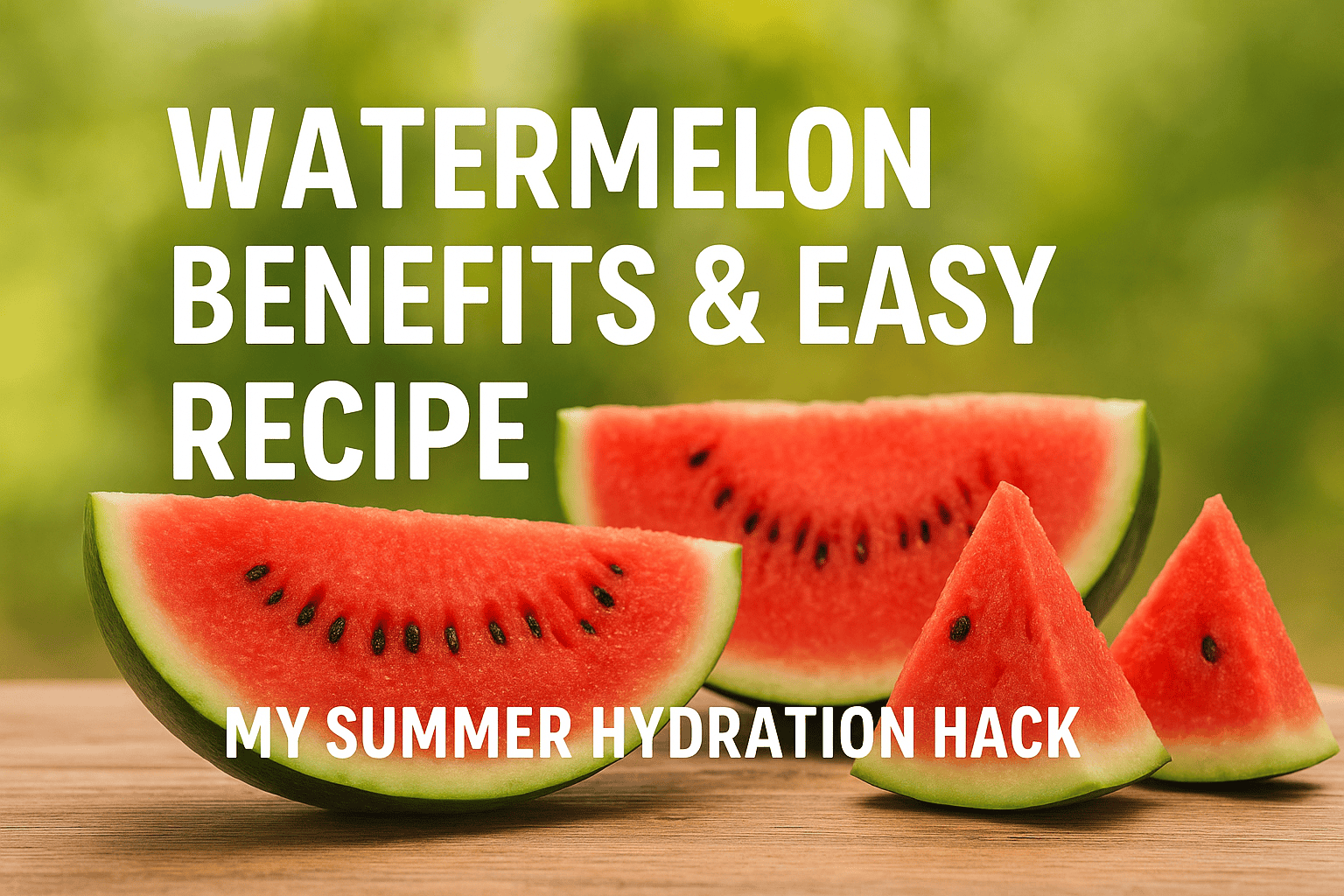My Personal Guide to a Healthy High-Calorie Diet: Gaining Weight the Right Way
Gaining weight can be just as challenging as losing it—especially if you’re someone with a fast metabolism, recovering from illness, or trying to build muscle. I’ve been there. After recovering from a serious illness that left me underweight and exhausted, I had to learn how to regain strength and healthy body mass the smart way. That’s when I discovered the power of a well-structured high-calorie diet—not just eating more, but eating better.
🧩 Why Choose a High-Calorie Diet?
A high-calorie diet is designed to increase daily calorie intake through nutrient-dense, energy-rich foods, helping your body rebuild, grow muscle, or recover. Whether you’re an athlete or someone struggling to gain weight, the goal isn’t to stuff yourself—but to nourish yourself.
🧠 Who Needs a High-Calorie Diet?
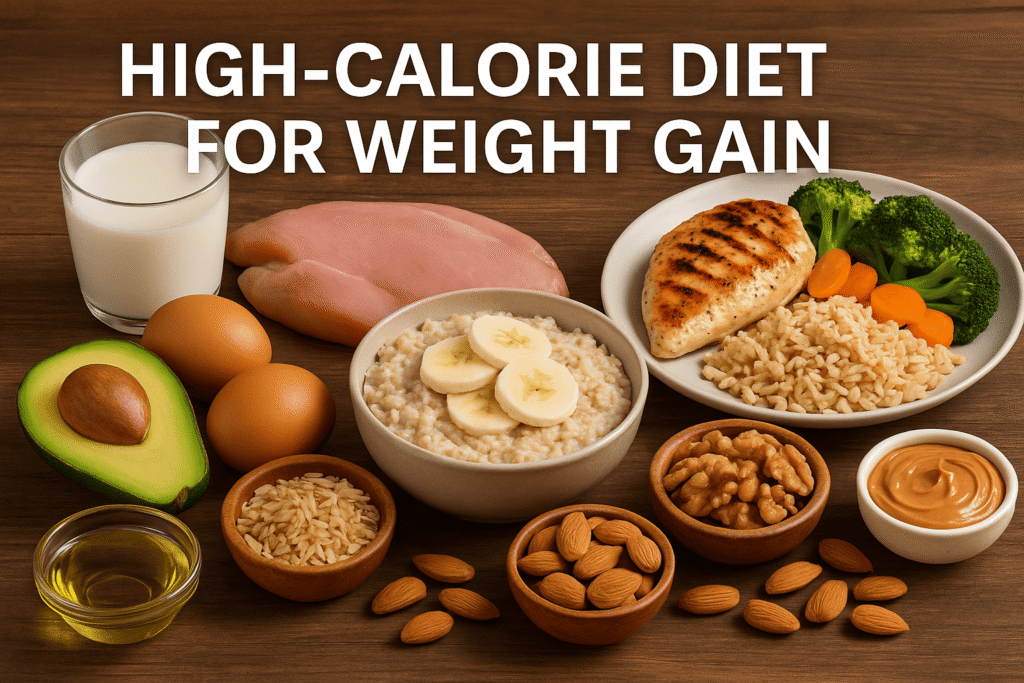
From personal experience and nutritional studies, here are the people who benefit the most:
- Underweight individuals due to genetics, illness, or eating disorders.
- Recovery patients, such as post-surgery or those recovering from infections or chronic illness.
- Athletes, especially in weight training or performance sports where muscle mass is critical.
- People with high metabolic rates, who burn calories faster than they consume them.
🧑⚕️ I started this journey after losing over 7 kg due to chronic fatigue syndrome. My diet, under guidance from a certified nutritionist, helped me rebuild strength and vitality safely.
👨⚕️ Principles of a Safe, Healthy High-Calorie Diet
I followed some golden rules to avoid mistakes. Here’s what worked for me:
- Gradual increase in calories: I added 300–500 kcal more per day over my maintenance level.
- Whole, natural foods: No junk—just real food like eggs, oats, rice, nuts, and quality oils.
- Frequent meals: 5 to 6 meals a day kept my energy stable.
- Macronutrient balance: Every plate had carbs, protein, and healthy fats.
- Strength training: To ensure weight gain was muscle, not fat.
🔍 How Many Calories Are “High-Calorie”?
Calorie needs are personal, but here’s a general example:
- Maintenance level: 2,200 kcal/day
- High-calorie target: 2,500–2,800 kcal/day
I started at 2,400 kcal and adjusted based on weight progress and energy levels. My nutritionist helped fine-tune it each week.
🥦 Recommended High-Calorie, Nutrient-Dense Foods
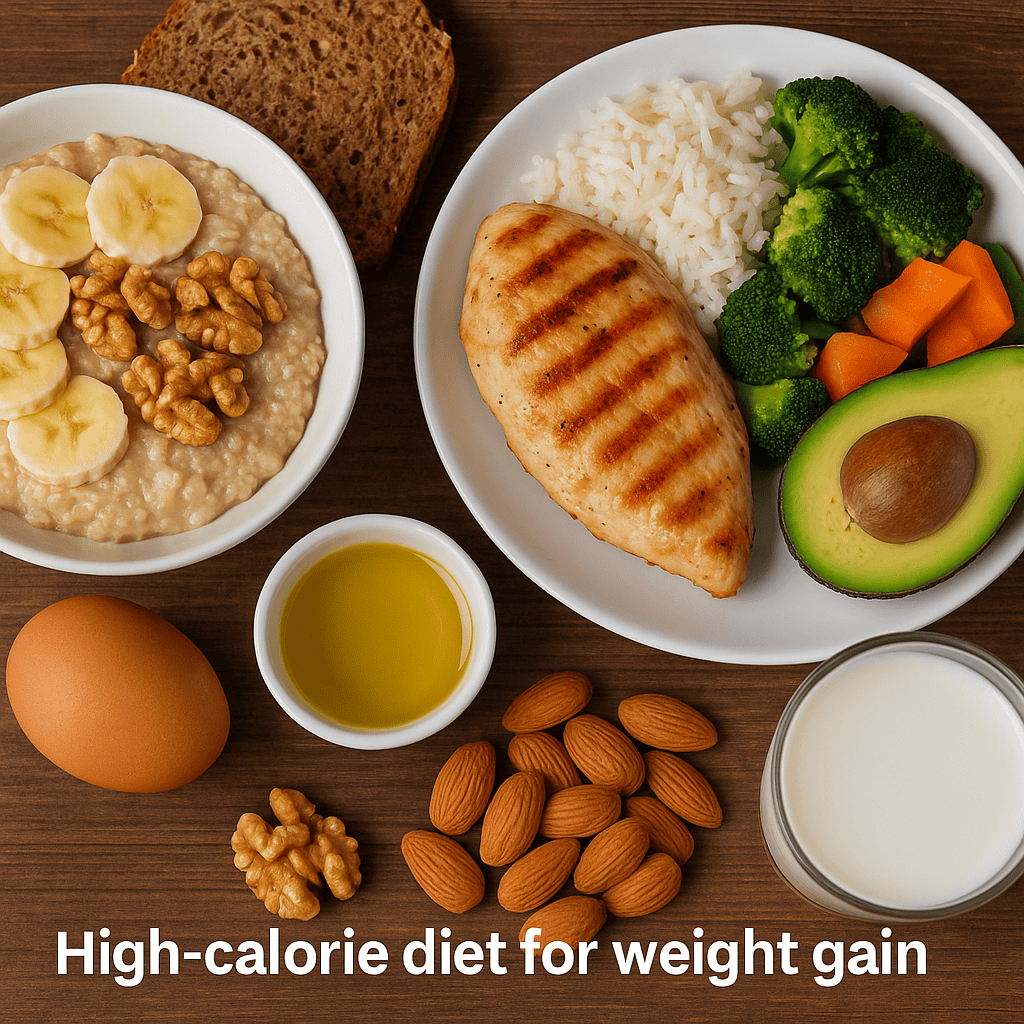
These foods helped me the most:
✅ Proteins
- Chicken breast, turkey, tuna, salmon
- Eggs and full-fat yogurt
- Lentils, beans, tofu
✅ Complex Carbs
- Oats, brown rice, quinoa
- Sweet potatoes, wholemeal pasta
✅ Healthy Fats
- Extra virgin olive oil
- Avocado, peanut butter, flax seeds
- Almonds, walnuts, chia seeds
✅ Smoothies & Dairy
- Banana + nut butter + milk smoothies
- Whole milk, aged cheese, plain yogurt
✅ I relied on smoothies a lot—they were an easy way to hit my daily goals without feeling bloated.
🥗 Example High-Calorie Meal Plan (What I Ate in a Day)
Here’s a real sample of my daily menu when I was trying to gain healthy weight:
| Time | Meal |
|---|---|
| Breakfast | Oats with whole milk, banana, walnuts, honey |
| Snack 1 | Whole-grain toast + avocado + boiled egg + fruit smoothie |
| Lunch | Grilled chicken + brown rice + sautéed veggies in olive oil |
| Snack 2 | Yogurt with granola, chia seeds |
| Dinner | Baked salmon + sweet potatoes + avocado salad |
| Evening | Banana smoothie with almond butter |
🚀 Pro Tips That Helped Me Succeed
- 🕑 Don’t skip meals—eat every 2–4 hours.
- 🥄 Add small calorie boosts—a spoon of peanut butter or olive oil adds ~100 kcal.
- 🥤 Smoothies are gold—calorie-dense and easy to digest.
- 🏋️ Train for strength—muscle mass gives shape and strength, not fat.
⚠️ Mistakes to Avoid in a High-Calorie Diet
From trial and error, here are common pitfalls:
- ❌ Relying on ultra-processed foods: Empty calories = poor nutrition.
- ❌ Overeating sugar: Leads to insulin spikes and fat storage.
- ❌ Ignoring protein: Muscle needs fuel to grow and recover.
- ❌ Eating just 2–3 meals: Hard to meet calorie goals this way.
🧪 Are Supplements Necessary?
For most, real food is enough. But in some cases, I found these helpful:
- Whey protein: Great for post-workout recovery.
- Creatine: Helped increase muscle volume and strength.
- Multivitamins: I took one daily due to initial deficiencies (doctor-approved).
⚠️ Always consult a doctor or dietitian before starting any supplements.
🩺 When Should You See a Specialist?
If any of these apply to you, speak to a professional before changing your diet:
- Underlying medical conditions (thyroid, digestive, psychological)
- Recovering from surgery or severe illness
- Past eating disorders
- Specific muscle gain goals
👨⚕️ I worked closely with my nutritionist, which made all the difference. A customized plan gave me results faster—and safely.
🏁 Conclusion: High-Calorie Can Be Healthy
A high-calorie diet isn’t about overeating—it’s about strategic nourishment. Thanks to the right plan, I gained weight, energy, and confidence. With patience, smart food choices, and support, you can too.

